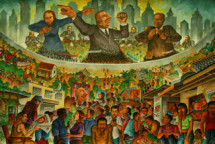Mission impossible? Social movement(s) and prospects for emancipatory rural politics in Zimbabwe
Temas
Regiones
An attempt to uncover some of the key political features of modern Zimbabwe.

Autores
Zimbabwe is often described as one African country that has made remarkable strides in terms of the socio-economic empowerment of the indigenous people, from victory in the liberation war to land reform and to an indigenisation and economic empowerment law. The latter’s touted main objective was to purportedly alleviate the plight of the poor indigenous majority by addressing economic imbalances which saw the minority control the economy. Nevertheless, a deeper examination, especially in the countryside, points to a situation of an abandoned revolution or a country in a counter-revolutionary mode.
We explore the role of social movements in the achievement of emancipatory rural politics in Zimbabwe. We focused on Zimbabwe Yadzoka Zvakare (loosely translated it means Zimbabwe has been revived) a social movement that is increasingly engaging in the agitation against authoritarianism in the countryside. The countryside is heterogeneous; to show this dissimilarity in the historical, socioeconomic classes, age, gender composition we draw our studies from two different sites in the district of Mutoko. The first site is a ‘new’ rural area that was formed after the fast track land reform, the second study site is a traditional “old” rural area that was established before independence and has now metamorphosed into a rural business center.
Through the data generated from the two sites, we argue that prospects for emancipatory rural politics in Zimbabwe exist albeit differently from one rural site to another based on a number of factors. These factors include but are not limited to, area specific factors; social movement acceptance, economic activities, demographics, history of the area/how the people got settled in the area, ruling party ideology acceptance/hegemony, access to resources such as land, traditional leadership, government service provision/patronage depth, and movement specific factors; resources, mobilization techniques.
The paper examines the following questions: how does ZYMIz mobilizes against authoritarianism; by utilizing social media which is ordinarily hard to police as well as using door to door tactics and taking advantage of community gatherings and events. Additionally, this research explores how the peasants in Mutoko exercise their agency in confronting oppression, what has ZIMYZ achieved, what are the challenges it faces, and whether the post-Mugabe political dispensation brought any changes in the arena of emancipatory rural politics especially with regards to th e role and operations of social movements? We pay attention to current conjectures; impending national election, the new Zimbabwe political landscape ushered in by the resigning under pressure of Robert Mugabe who was at the helm of Zimbabwean politics for 37 years and subsequent leadership change in ZANUPF.
This paper was presented at the Emancipatory Rural Politics Initiative (ERPI) 2018 Conference: "Authoritarian Populism and the Rural World"